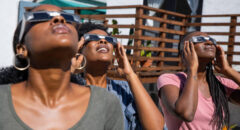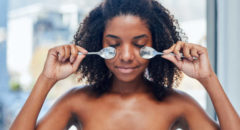
(BlackDoctor.org) — Winter can be especially harsh on your eyes. Damaging sun reflections off snow and dry indoor air conditions can irritate your eyes and impair your vision.
Here’s how you can care for your eye health this season and help prevent long-term eye health problems, such as a damaged cornea or cataracts.
Problem 1: Dry air conditions
The most common eye complaint in winter is dryness, which creates a burning or itchy sensation or the feeling that a foreign object is in your eye. The cause may be the lower humidity levels inside your home or office when the heat is on and the windows are closed. Spending time outside on windy winter days can also have a drying effect.
People who wear contact lenses are the ones most likely to experience this problem, but it can affect anyone, particularly peri- and post-menopausal women who may have eye dryness because of loss of estrogen. “Sometimes people come in complaining that their eyes are watering too much,” says Dr. Pierre Faber, chair of the department of ophthalmology at Providence Health Care in Vancouver. “That’s because their eyes don’t tear as they should and when they get dry and irritated, it makes them water like crazy.” Over time, dryness can cause blurred vision or damage the cornea, which can also lead to blurriness.
What can you do?
• Moisten your eyes. Drink extra fluids and use a hot- or cold-air humidifier while you’re awake and your eyes are open.
• Add tears. Lubricating eye drops provide comfort. “These saline or tear gels or ocular lubricant drops, available over the counter at drugstores, help supplement the natural tear layer and keep the tears from evaporating so quickly,” explains Ralph Chou, an associate professor in the school of optometry at the University of Waterloo.
• Blink more. When you’re concentrating on a complex visual task, such as using a computer, you just don’t blink as often, which can exacerbate winter dryness, says Chou. If your eyes feel dry at work, make a point of blinking more often.
• Wear glasses. If you’re outdoors on a blustery day, sunglasses will








